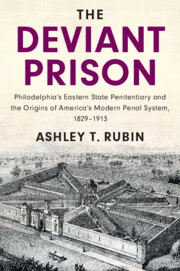 The Deviant Prison
The Deviant Prison Book contents
- Frontmatter
- Contents
- List of Figures
- List of Tables
- Acknowledgements
- List of Abbreviations
- A Brief Timeline
- Important Actors
- Introduction
- Part I Becoming the Deviant Prison: Establishing The Conditions for Personal Institutionalization
- 1 Faith and Failure: Experimenting with Solitary Confinement in America’s Early State Prisons
- 2 Born of Conflict: The Struggle to Authorize the Pennsylvania System
- B The Men in Charge
- 3 Uncertainty and Discretion: The Contours of Control at Eastern State Penitentiary
- 4 Criticism and Doubt: The Pennsylvania System and the Social Construction of Penal Norms
- Part II THE ADVANTAGE OF DIFFERENCE: The Process of Institutionalization
- Part III Forced to Adapt: The Conditions for and Process of Deinstitutionalization
- Appendix A Inspectors
- Index
1 - Faith and Failure: Experimenting with Solitary Confinement in America’s Early State Prisons
from Part I - Becoming the Deviant Prison: Establishing The Conditions for Personal Institutionalization
Published online by Cambridge University Press: 12 January 2021
- Frontmatter
- Contents
- List of Figures
- List of Tables
- Acknowledgements
- List of Abbreviations
- A Brief Timeline
- Important Actors
- Introduction
- Part I Becoming the Deviant Prison: Establishing The Conditions for Personal Institutionalization
- 1 Faith and Failure: Experimenting with Solitary Confinement in America’s Early State Prisons
- 2 Born of Conflict: The Struggle to Authorize the Pennsylvania System
- B The Men in Charge
- 3 Uncertainty and Discretion: The Contours of Control at Eastern State Penitentiary
- 4 Criticism and Doubt: The Pennsylvania System and the Social Construction of Penal Norms
- Part II THE ADVANTAGE OF DIFFERENCE: The Process of Institutionalization
- Part III Forced to Adapt: The Conditions for and Process of Deinstitutionalization
- Appendix A Inspectors
- Index
Summary
This Introduction identifies Eastern’s puzzling position in the landscape of nineteenth-century prisons: one of a few prisons, and then the only prison, to use a system of long-term solitary confinement. This chapter explores the historiography of Eastern and the early prisons looking for answers to the question of why one prison alone would continue to use a highly criticized mode of confinement? Turning to organizational theory, we find an answer in Philip Selznick’s “old” institutional theory. This chapter then identifies some of the ways in which a unique prison’s history helps us better understand the development of nineteenth-century prisons and penal change more generally. It concludes with some methodological notes.
Keywords
- Type
- Chapter
- Information
- The Deviant PrisonPhiladelphia's Eastern State Penitentiary and the Origins of America's Modern Penal System, 1829–1913, pp. 5 - 34Publisher: Cambridge University PressPrint publication year: 2021
